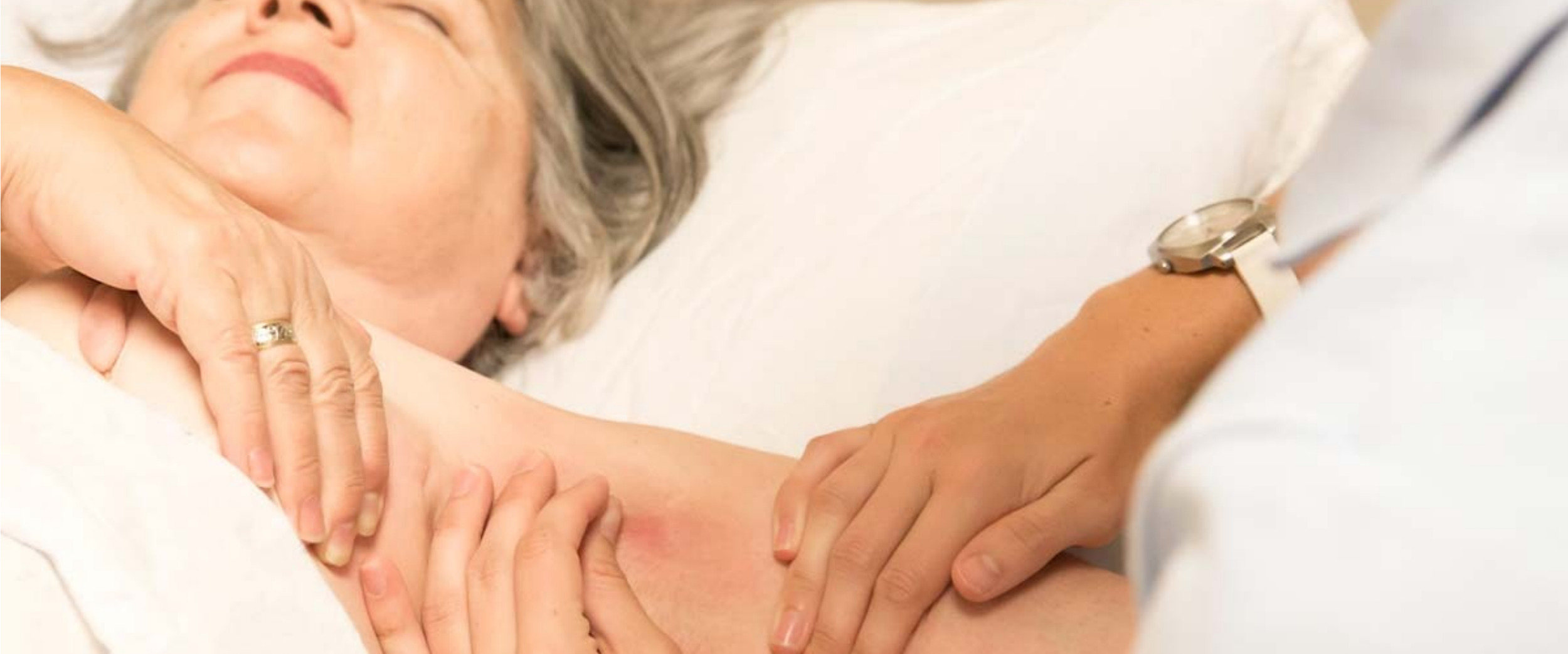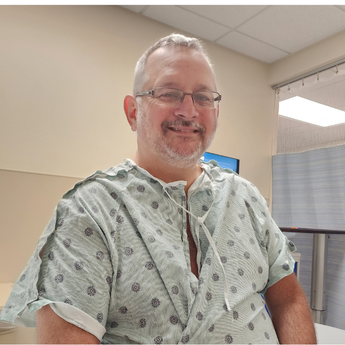A breast cancer diagnosis comes with so many questions and there never seems to be enough time at appointments to have some of these questions answered. To help address this, we developed a "Q&E: Questions and Experts" series. In this series, a variety of experts spend the entire virtual session answering pre-submitted and live questions from participants. Watching the videos on-demand might be a little difficult to get through. So, we’ve created this guide to help you get right to the questions and answers that matter the most to you.
In today’s post, we provide the questions that were sent in and asked during the live session of our Questions and Experts session held on February 20th, 2023. In this session, Certified Lymphedema Therapist Marize Ibrahim answers your questions about breast cancer-related lymphedema. In the parentheses, you’ll find the timestamp of where to find the question in the on-demand video.
Compression Garments
- I use a compression garment only for flying; how often should I replace it? (15:13)
- What are the differences between daytime compression and nighttime compression garments? (17:47)
- Can you combine the use of compression garments and exercise at the same time? (29:02)
- Do all individuals get free access to a lymphedema specialist or clinic and compression garments, or do you have to use insurance or Medicare? (45:20)
- Are there any updates on the robotic [compression] sleeve that was developed in Canada? (58:56)
- How important is wearing a compression sleeve every day? (1:24:26)
Research & Resources
- Is there any research-based evidence or statistics that talk about which is the more proven or effective type of therapy? (26:43)
- Are there any updates on the robotic [compression] sleeve that was developed in Canada? (58:56)
- Are there any research articles on lymphedema management and where can you find them? (1:26:45)
- Are there any more specific resources on lymphedema prevention that's specific to breast cancer? (1:04:45)
- What research is being done right now on a cure or more beneficial therapies? (30:23)
Surgery & Surgical Practices
- How long after surgery can lymphedema develop? (2:13)
- Can you get mild lymphedema after surgical intervention and not have it become a problem? (5:05)
- How soon after surgery can you safely take a flight? (16:46)
- Who is qualified to surgically fix or release a trigger finger on the same arm in which nodes were removed? (33:43)
- Can you explain lymph node transplants, and is this a treatment that is available in Canada? (1:00:18)
- Once breast reconstruction with an insert is completed, could this aggravate the lymph nodes? (1:24:08)
- If somebody is a candidate to have lymph node transplants, do the oncologist, the oncology team, and surgeon all need to know about this? (1:02:11)
Side Effects and Symptom Management
- What do I need to be mindful of to avoid making my lymphedema worse? (12:17)
- What kind of exercises can I do to control swelling and build up strength in the limb? (19:43)
- Does drinking fluids help? (55:29)
- What can trigger swelling if I’m following all precautions? (43:04)
- I feel a tightness in my upper arm only after exercising which usually goes away after a day; is this a normal reaction to exercise or is it lymphedema-related? (1:06:11)
- Is it unwise to use hot tubs when you have lymphedema? (28:00)
- What kind of exercises can I do to help reduce swelling for lymphedema that is only in my breast? (39:00)
- What can you do while waiting to see a doctor [for diagnosis] to manage discomfort in your arms? (48:41)
- Is it normal for your armpit to have pain or go numb and stay hard for a long time? (40:04)
Clinics, Therapists, and Cancer Centers
- What percentage of cancer treatment centers include an assessment for potential lymphedema? (8:28)
- How often should you see a registered therapist for manual drainage? (25:14)
- When is the right time to go to a lymphedema specialist and how can you find one? (1:09:47)
- Are cancer centers generally aware of lymphedema? (1:16:00)
- Do you need a referral from an oncologist to see a lymphedema therapist? (1:19:04)
- Is it standardized care to inform all patients abou the possibility of lymphedema? (9:23)
- Is there a difference between doing self-massage and having a professional do it? (35:27)
- Do all individuals get free access to a lymphedema specialist or clinic and compression garments, or do you have to use insurance or Medicare? (45:20)
Swelling
- What are the steps to diagnose lymphedema, and is it always associated with swelling? (51:02)
- Why does the swelling occur and how dangerous is it? (52:28)
- What could be a reason for sudden exacerbation of swelling in a previously stable arm? (32:43)
- What kind of exercises can I do to help reduce swelling for lymphedema that is only in my breast? (39:00)
- What kind of exercises can I do to control swelling and build up strength in the limb? (19:43)
Self-Care Tips and Best Practices
- What shavers do you advise women to get for shaving their armpits to avoid nicks and cuts? (22:00)
- Are there any specific foods that someone with lymphedema should eat or avoid? (37:17)
- What should you do if you have lymphedema and experience a cut or a burn in that area? (1:17:04)
- If you are a diabetic and have lymphedema, is fingertip blood glucose testing advisable or not? (1:09:06)
- Is getting electrolysis or laser hair removal better than shaving? (38:14)
- Do you recommend pneumatic pumps for home use? (50:15)
- Does drinking fluids help? (55:29)
- Can you combine the use of compression garments and exercise at the same time? (29:02)
- What do I need to be mindful of to avoid making my lymphedema worse? (12:17)
- Is it unwise to use hot tubs when you have lymphedema? (28:00)
The Five Pillars of Care
- What are the 5 pillars [of lymphedema care? (36:46)
- Are the pillars the same for different types of lymphedemas, such as in the breast or chest instead of the arm? (56:29)
Drainage & Massage
- What is dry brushing, and can you speak more about that? (57:17)
- Is there a difference between doing self-massage and having a professional do it? (35:27)
- How often should you see a registered therapist for manual drainage? (25:14)
General Questions
- How likely is lymphedema and how dangerous is it? (7:47)
- Can you have lymphedema in areas other than your limbs or chest, such as your side or armpits? (34:24)
- Do people who have been diagnosed with lymphedema have a higher risk of carpal tunnel syndrome? (1:20:51)
- Do men also get like breast cancer-related lymphedema? (1:22:30)
Resources
https://cbcn.ca/en/blog/our-stories/lymphedema-treatments
https://cbcn.ca/en/blog/our-stories/Lymphedema-Management
https://jeanlamantia.com/jeans-nutrition-books/the-complete-lymphedema-management-and-nutrition-guide/
https://cbcn.ca/en/blog/our-stories/Lymphedema-book-review
https://cbcn.ca/en/listing-directory/Financial-Resources-for-Breast-Cancer-Patients/compassion-fund (Ontario only. For other provinces, see our FinancialNavigator tool).
https://cbcn.ca/en/blog/our-stories/lymphedema-risk-factors
https://cbcn.ca/en/blog/our-stories/lymphedema







